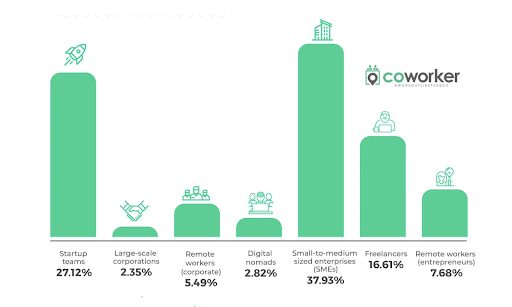Flex office spaces are taking workplace flexibility to another level. And mind you, by flexibility, we don’t mean flexible work arrangements just for employees.
Flexible offices are fast becoming a rage among businesses too. To employers, flexible office spaces mean dynamic office arrangements which help them stay agile in response to economic uncertainty.
These highly adaptable office layouts come with incredible ease to accommodate changing business objectives and can be scaled up or down rapidly to suit different team sizes at any given time.
While they are becoming commonplace, their sheer diversity can be quite baffling. As a business owner, understanding their differences will be vital for you to select the right office space that best suits your business needs and objectives.
The two of the most popular flex office spaces that spring to mind are Serviced offices and Coworking spaces.
Our previous article talked about the nuts and bolts of coworking spaces. This article will walk you through serviced offices and what makes them stand apart from coworking spaces.
So, let’s dive in.
A serviced office (a.k.a. executive offices or managed offices) is a fully-equipped leased office that offers the flexibility of the pay-as-you-go model.
Moving in a serviced space can be your handy option if you are done away with the headaches of lengthy leases and hidden costs of conventional office spaces and want to enjoy access to a private and ready-to-move-in office space.
You can rent anything from a single office, a single floor to several floors in a building managed by a facility management company. These all-inclusive leased spaces come with flexible contracts of the duration as short as a month. The briefer tenure allows entrepreneurs to assess their business scenario without locking themselves in long-term contracts.
Still, you can avail yourself of everything you might expect from a typical office, including facilities like phone, internet, fax machines, copiers, office furniture, audio-visual equipment, etc. The best part is that the amenities are pre-installed to keep businesses up and running as soon as they move in without facing downtime.
Some operators also cater to their tenants with additional utilities like conference rooms, reception services, IT infrastructure, security, pantry, cleaning, maintenance, and parking.
Of course, the precise range of services offered at each serviced space varies and may play a decisive role when you zero in on a suitable space for your enterprise.
Like the serviced offices, the concept of coworking spaces revolves around flexible workspaces. However, the emphasis here is more on collaboration, networking, and community building between the members who hail from diverse or similar industries.
From hot desks and dedicated desks in the open-plan environment to private spots for work that requires solitude, you will find everything that causes coworking spaces to swarm with freelancers, startups, SMEs, MNCs, and corporates alike. They usually operate on the membership model wherein occupants pay a certain amount of membership fees to operate in a professional yet flexible working environment while enjoying top-notch office amenities.
It’s not uncommon to see people using these two terms interchangeably. However, while some overlapping features exist, the stark differences make serviced offices an entirely different concept from coworking space.
And why do we care to explain them? Because this would help you define the way you run your business.
Let’s find out.
Because serviced spaces come with everything you’ll need to run your office at flat rates without any hidden costs, they are increasingly being leased by a variety of users such as:
On the other hand, coworking spaces, which initially emerged as freelancing nomads’ hubs, have now turned into networking spaces for budding start-ups and SMEs.
Some of the statistics reveal a significant shift in the subsets of coworking space users as the coworking industry expands.
A study by Coworker on the demographics of coworking members found that SMEs and start-up teams represent first and the second most common demographics at 37.93% and 27.12%, respectively. On the contrary, digital nomads and freelancers represented the study on a much smaller scale than expected.

These numbers reflect that the modern coworking spaces are gradually moving towards a “hybrid” model with both open plan and private spaces to accommodate the needs of start-ups, SMEs, and freelancers alike.
The design and layout of shared offices tend to have a more professional feel. The compartmentalization of traditional offices inspires the overall design. Even if multiple clients occupy the building, each workspace is private and isolated from the rest of the workspaces to limit interference by others. In some cases, electronic doors and key cards-linked elevators offer enterprises a heightened level of privacy.
Moreover, since serviced office operators allow clients to modify their private rooms, large organizations may also delegate separate sections to different teams and sort their employees, allowing them to work more efficiently.
In contrast, typical coworking spaces are designed with open floor plans and unconventional furnishings like bean bags and couches to optimize interactions.
Although there are some private spots, open desks arrangement and very few barriers make the space throb with high levels of vivaciousness. Their style and feel exude a more relaxed and upbeat ambiance, something like a high-end coffee shop.
No brownie points for guessing which one of the two workspaces offers more privacy.
Serviced offices are ideal spaces for businesses that value the privacy of their work more than anything else. And there are legit reasons for it.
Firstly, many enterprises deal with sensitive data related to clients, employees, trade secrets, etc. Excessive interactions and openness might put the security of this information at risk and expose companies to lawsuits. Hence, such organizations prefer the private suites of serviced offices.
Secondly, without undermining the stimulating environment of coworking spaces, many leaders feel the need to have serviced offices that provide their teams with a sense of ownership, better control, and lower distractions for more efficient operations.
Coworking spaces, except for a dedicated workstation and storage space, lack the element of privacy. Nonetheless, the community culture comes as a perk for those who find it crucial to interact and network with cross-industry talents. The very collaboration helps them grow and thrive in their respective careers.
Both the flexible workspaces are the future of work in their own rights. However, the ultimate decision to move into one of them boils down to your business objectives.
But it’s worth considering the following points to get a better perspective:
A serviced office is your ideal space if you need:
Local and global enterprises trust The Address for a premium flexible workspace experience. Serviced offices or Coworking spaces in Ahmedabad, we have the perfect solution for you.
Explore Our Serviced And Coworking Facilities Now!
What are the best locations for Coworking Space In India

